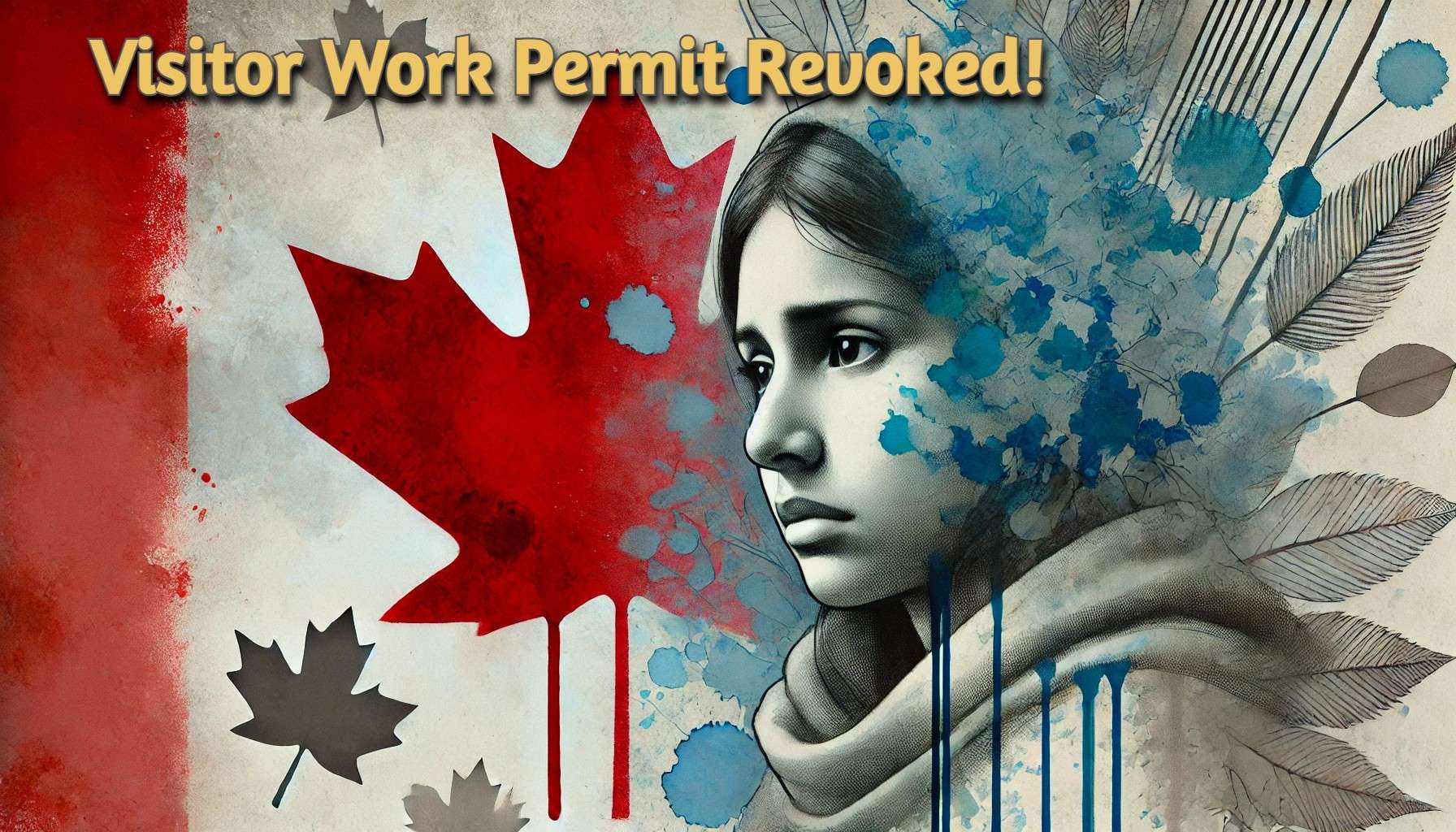
Canada Ends Visitor Work Permit Policy: What Are Your Options?
Author: Al Parsai, LL.M, RCIC-IRB
Last Updated On: August 29, 2024
On August 28, 2024, Canada revoked the temporary Visitor Work Permit policy. This policy allowed visitors to apply for work permits from within the country. Originally introduced in August 2020 during the COVID-19 pandemic, this policy offered a crucial opportunity for many. However, with its sudden end, you may wonder about your next steps. This article will explain your options and guide you through the available alternatives.
Visitor Work Permit under Section 199 of the Regulations
Under section 199 of the Immigration and Refugee Protection Regulations (IRPR), certain visitors in Canada may apply for a work permit while in Canada. Here’s who qualifies:
Visitors with a temporary resident permit (TRP): You can apply if your TRP is valid for at least six months.
Family members of eligible individuals: You may apply if your family member qualifies under certain circumstances. Typical family members who are eligible include the following:
Individuals in special situations: You qualify under sections 206 (No other means of support) or 207 (Certain permanent resident applicants in Canada) of the Regulations.
Applicants with pre-approved work permits: If you received written approval for a work permit before entering Canada, you may apply now. This option is mostly redundant nowadays.
Applicants under specific international agreements: You can apply if you qualify as a trader, investor, or professional under agreements like NAFTA (now CUSMA).
Individuals with a no-objection letter: You may apply if Global Affairs Canada has no objection to your work at a foreign mission in Canada. This option mostly applies to diplomats and their family members.
I have another article that explains section 199 in more detail.
What the Now-Revoked Public Policy Covered
The now-revoked public policy, effective August 2020, allowed visitors to apply for work permits in Canada. This policy aimed to help visitors stranded due to COVID-19 travel restrictions. Visitors could apply for a work permit without leaving Canada, a significant change from previous rules under section 199. Moreover, IRCC extended the policy multiple times. The last extension was originally valid until February 28, 2025.
However, on August 28, 2024, IRCC revoked this public policy, marking a return to stricter rules. Visitors now must rely on Section 199 or other exemptions. Otherwise, they may not apply for a work permit inside Canada. Nonetheless, IRCC will process applications submitted before August 28, 2024.
Who is Exempt from the Visitor Work Permit Policy Revocation
If you are a visitor to Canada and section 199 applies to you, then you may still apply for a work permit while in Canada. However, other visitors could be exempt because of other exemption codes and public policies. Here are some examples.
People who submitted their applications before Aug 28, 2024.
The spouses or common-law partners of Canadian citizens or permanent residents. However, they must have a sponsorship application in process.
A group of visitors under the public policy for family members who fled conflict in Sudan (to end on October 27, 2024)
Certain visitors under the public policy for Haitian nationals in Canada (to end on November 19, 2024)
A group of visitors under the public policy to exempt certain Hong Kong residents from work permit requirements (to end on February 7, 2025)
The public policy for Iranians (to end on February 28, 2025)
Certain visitors who arrived under the Canada-Ukraine authorization for emergency travel measures (to end on Mar 31, 2025)
A group of visitors who left Israel or the Palestinian Territories on or after October 7, 2023 (to end on July 31, 2025)
Please note that Canada may abruptly revoke any of these public policies. Moreover, there could be others in effect that I could not locate.
What to Do if You Are Affected by the Visitor Work Permit Policy Revocation
If the policy revocation affects you, consider your next steps carefully. The safest option is to leave Canada and apply for a work permit abroad. This method follows the traditional process and reduces the risk of complications.
Another option is “flagpoling.” This involves leaving Canada briefly at a US/Canada land border and re-entering to apply for a work permit. However, remember that this option has restrictions. Some border services may not allow it, especially during busy times or under specific circumstances. Therefore, always check the latest rules before attempting this. Book a consultation session to see if this option is possible for you.
Some might think they can stay in Canada and apply using the “Outside Canada” work permit form. However, this approach is risky. Section 199 is about where you are physically, not which form you use. Applying from inside Canada using the wrong form could lead to the refusal of your application. Furthermore, you could receive a Procedural Fairness Letter or even face a five-year ban for misrepresentation if authorities discover any inconsistencies.
Therefore, always seek advice from qualified immigration professionals before taking any action. They can help you navigate your options safely and legally.
Let Us Help!
If you want to apply to stay temporarily or permanently in Canada, we are here to help. You can book a consultation session with me or fill out the following form to contact our team directly.
Would you please fill out our free assessment form if you wish to visit or move to Canada? We will review it for free, but we will contact you only if we find an opportunity for you. Alternatively, you may book a consultation session. Consultation sessions are not free, but you will receive formal immigration advice from a licensed practitioner.
Al ParsaiAl Parsai, LLM, MA, RCIC-IRBRegulated Canadian Immigration ConsultantAdjunct Professor – Queen’s University – Faculty of LawAshton College Instructor – Immigration ConsultingAuthor – 88 Tips on Immigration to Canada
Fill our Free Canada Immigration Assessment Form in your language!
Disclaimer:This article provides information of a general nature only. Considering the fluid nature of the immigration world, it may no longer be current. Of course, the item does not give legal advice. Therefore, do not rely on it as legal advice or immigration advice. Consequently, no one could hold us accountable for the content of these articles. Of course, if you have specific legal questions, you must consult a lawyer. Alternatively, if you are looking for immigration advice, book an appointment.
The characters and places in the articles:All the characters and locations in the articles are fictional, unless otherwise clearly stated. Therefore, any resemblance in names, dates, and places is coincidental.
Important Notes:For our official addresses, trust this website only. We currently do not have offices outside Canada. Therefore, anyone who claims to be our agent is committing fraud. Also, note that we do not issue any work permits or study permits or similar documents. The government of Canada has the sole authority to issue such material.
Click to read the disclaimer.
Al Parsai, LL.M, RCIC-IRB
Al Parsai is a distinguished Regulated Canadian Immigration Consultant (L3 RCIC-IRB – Unrestricted Practice) hailing from vibrant Toronto, Canada. Al’s academic achievements include an esteemed role as an adjunct professor at prestigious Queen’s University Law School and Ashton College, as well as a Master of Laws (LLM) degree from York University (Osgood Hall Law School). A respected member of CICC, Al’s insights are further enriched by his experience as the dynamic CEO of Parsai Immigration Services. Guiding thousands of applicants from over 55 countries through the immigration process since 2011, Al’s articles offer a wealth of invaluable knowledge for readers.
Canada Ends Visitor Work Permit Policy: What Are Your Options?
News
Ugandan Citizen Abducted, Held in Secret Detention for Three Months, Sparks Outrage and Calls for Justice

A disturbing new case of unlawful detention has surfaced, highlighting the ongoing human rights crisis in Uganda. A Ugandan citizen was reportedly abducted and held in a secret facility, known as a “safe house,” for three months, only to be released without charge or explanation. This incident, reported by NTV Uganda, has sparked widespread condemnation and renewed calls for accountability regarding human rights abuses in the country.
While the details surrounding the abduction remain unclear, reports indicate that the individual was taken without due process and held incommunicado—an action that has long been condemned by human rights organizations. The victim’s release, with no charges filed and no clear justification, has angered activists and citizens, who view this as yet another case of egregious abuse of power by the state.
“This is a recurring pattern,” said one human rights activist. “Abductions, secret detentions, and unexplained releases have become all too common in Uganda. These acts violate fundamental human rights and erode public trust in the justice system.”
The use of “safe houses,” unregistered detention facilities reportedly operated by security forces, has been a focal point in numerous allegations of torture and illegal imprisonment. Despite repeated calls from both local and international organizations for their closure and accountability for those involved, little action has been taken to address these violations.
This case underscores the urgent need for reform within Uganda’s security apparatus and greater accountability for human rights abuses. Observers hope that drawing attention to these injustices will spur concrete action to bring those responsible to justice and ensure the protection of basic human rights.
As frustration mounts, calls for both domestic and international pressure to hold the government accountable for such crimes grow louder. “One day, there must be accountability for all these crimes against our people,” stated one social media user, reflecting the sentiments of many Ugandans.
News
NUP Gathering Disrupted: Kyagulanyi Alleges Security Force Harassment and Arrests

National Unity Platform (NUP) President Robert Kyagulanyi has accused Ugandan security forces of using excessive force to disrupt a planned NUP gathering. The allegations were detailed in a statement shared on Twitter, following an event held to honor children of NUP supporters who were killed, disappeared, or detained for their political beliefs.
According to Kyagulanyi, security personnel, under the command of an officer identified as Asiimwe, carried out a preemptive operation early in the morning upon learning of the NUP’s plans. The forces allegedly stormed the premises, arrested workers, and deployed tear gas to disperse those present.
“The criminals under the command of one Asiimwe deployed early morning, arrested our workers, and threw tear gas into our premises. They’ve cordoned off the premises and blocked all people from accessing the place,” Kyagulanyi wrote.
Among those reportedly arrested were Saava Peter, Mudenya Samson, and Turyasingura Samson. Kyagulanyi claimed the detained workers were subjected to beatings and interrogated about their political affiliations, with security operatives labeling them as terrorists.
“These JATT operatives asked the workers who they support politically, branding them terrorists and criminals—their only crime being that they work with us. You can imagine the indignity!” Kyagulanyi lamented.
This incident adds to the growing tension in Uganda’s political climate, where opposition parties frequently accuse the government of stifling dissent. Despite the challenges, Kyagulanyi ended his statement with a message of defiance and optimism, proclaiming, “UGANDA WILL BE FREE.”
NUP Gathering Disrupted: Kyagulanyi Alleges Security Force Harassment and Arrests
News
Sudan Demands Apology from Uganda Over Army Chief Muhoozi Kainerugaba’s Threat to Invade Khartoum

Sudan has demanded an official apology from Uganda over “offensive and dangerous” comments made by the chief of Uganda army staff, who threated to invade Khartoum, the Sudan Tribune has reported.
General Muhoozi Kainerugaba, son of Ugandan President Yoweri Museveni and CDF of the Ugandan army, posted two comments on the X platform on Tuesday in which he threatened “to capture Khartoum” with the support of the US President elect Donald Trump after he takes office. The posts were deleted later.
“The government of Sudan demands and official apology from the Ugandan government for the offensive and dangerous comments of the army commander,” Sudan’s foreign ministry said in a statement that the Sudan Tribune said it has seen.
Sudan Demands Apology from Uganda Over Army Chief Muhoozi Kainerugaba’s Threat to Invade Khartoum









